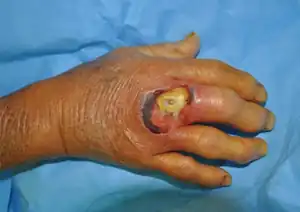Fusariosis
| Fusariosis | |
|---|---|
 | |
| Photograph of the subject when she first visited the hospital. There was a painful progressive skin ulceration around the right third knuckle and proximal phalanx after a snake bite two weeks earlier. | |
| Risk factors | Neutropenia, blood cancer |
| Prognosis | Poor[1] |
Fusariosis is an infection seen in people with low neutrophils, a type of white blood cell that fights infection. It is a significant opportunistic pathogen in people with blood cancer.[2]: 330
It is associated with infections with Fusarium species, such as Fusarium proliferatum.[3]
It is fatal in more than half of cases.[1]
References
- 1 2 Vallabhaneni, Snigdha; Mody, Rajal K.; Walker, Tiffany; Chiller, Tom (2016). "1. The global burden of fungal disease". In Sobel, Jack; Ostrosky-Zeichner, Luis (eds.). Fungal Infections, An Issue of Infectious Disease Clinics of North America. Philadelphia: Elsevier. pp. 5–12. ISBN 978-0-323-41649-8. Archived from the original on 2021-06-02. Retrieved 2021-06-05.
- ↑ James, William D.; Berger, Timothy G.; et al. (2006). Andrews' Diseases of the Skin: clinical Dermatology. Saunders Elsevier. ISBN 0-7216-2921-0.
- ↑ Neuburger S, Massenkeil G, Seibold M, et al. (July 2008). "Successful salvage treatment of disseminated cutaneous fusariosis with liposomal amphotericin B and terbinafine after allogeneic stem cell transplantation". Transpl Infect Dis. 10 (4): 290–3. doi:10.1111/j.1399-3062.2007.00296.x. PMID 18194367. S2CID 33310278.
External links
| Classification | |
|---|---|
| External resources |
|
This article is issued from Offline. The text is licensed under Creative Commons - Attribution - Sharealike. Additional terms may apply for the media files.